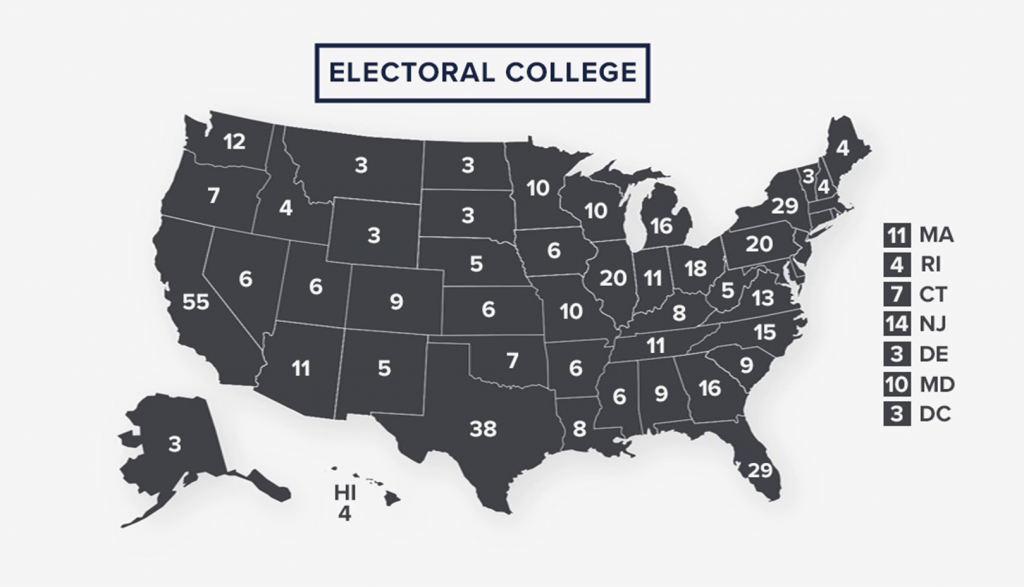After the discourse-charged presidential election in 2020, have you been searching for unbiased political news? Are you paying more attention to politics as the US recovers from coronavirus? The average person is constantly bombarded by biased political information. So, how are we meant to educate ourselves, especially about a system called the Electoral College, which is more than two centuries old?
During the general election, Americans go to their polling place to cast their vote for a president. But the tally of those votes – the popular vote – does not determine the winner. Instead, presidential elections rely on the Electoral College.
If that all comes as a shock, here we’ll explain what the Electoral College is, when it happens, and who the electors are.
A Long Voting History: What’s the United States Electoral College?
The Electoral College is a key player in the final phase of a presidential election. It happens after primaries and caucuses, where party members vote for the candidate that will represent them in the general election; after national conventions, where each party selects a final presidential nominee and the candidate chooses a running mate; and after the general election, where every US state votes for one Presidential candidate.
When people cast their vote for the president of the United States, they are actually voting for a group of people called electors. These representatives took the final step which made Joe Biden the 46th president of the US.
Presidential elections happen every four years on the first Tuesday in November. In December, electors cast their votes in the Electoral College. And then, the newly elected President and Vice President are inaugurated on January 20, after Congress counts the electoral votes on January 6.
After the general election, the public’s votes determine electors who formally choose the president through the Electoral College. Therefore, the president is indirectly elected by the general public through 538 electors representing the 50 states and the District of Columbia.
The number of electors each state gets is equal to its total number of Senators and Representatives in the Congress (New York has 29 electors, for example). Each elector casts one vote: They convene in state capitols across the country to swear an oath to uphold the Constitution, mark small pieces of paper, and drop them in ballot boxes.
A majority of 270 electoral votes is required to select the president. If no candidate receives a majority, the House of Representatives chooses the president, and the Senate decides who will be the vice president.
So, who are these electors?
Article II, Section 1, clause 2 of the Constitution states that “no Senator or Representative, or Person holding an Office of Trust or Profit under the United States, shall be appointed an Elector.”
Parties either nominate potential electors at their Slate party conventions or the party’s central committee vote. Most of the presidential electors are relatively anonymous party functionaries selected for their loyalty and reliability in voting for a candidate they’ve pledged to support. And the Supreme Court ruled earlier this year that states can effectively prevent so-called faithless electors from going rogue.
They can serve for a limitless amount of time. For example, Randi Weingarten, the American Federation of Teachers president and shortlist candidate for Biden’s education secretary, served as a presidential elector in New York for the third time in 2020.
Vote Smart: Is there another way?
The Electoral College is sometimes under attack, particularly from Democrats who have won the popular vote twice this century while losing the Electoral College.
Critics are searching for another route that does not involve altering the Constitution. Since 2006, the legislatures of 15 states and the District of Columbia have enacted the National Popular Vote Interstate Compact. It means that states must award their presidential electors to whichever candidate wins the most votes nationwide, even if another contender captured more in their state. The accord will only take effect once enough states representing 270 electoral votes pass the bill.
Understanding how democracy works is crucial to be an active member of society. We’ve all heard about elections and influential bodies like the Electoral College, but it is our duty as citizens to stay informed at all times. By engaging with organizations that provide unbiased information, we can make the best decisions as active citizens.
If all this information feels overwhelming, and you want to take a deep dive into US politics and information about your current elected representatives, check out our other blogs!

